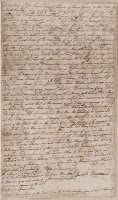 The earliest record of Samuel Reeves in Rowan County is a 1795 deed to Edward Taylor. By 1799, Samuel conveyed 91 acres of a tract he had purchased from James Dobbins in 1798, to his son Thomas Reeves. This transaction is mentioned in Samuel's 1801 will and he states that Thomas is therefore exempted from any further share of his estate. The only other children named in Samuel's will are James and Mary who was married by 1801 when the will was written and referred to as Mary Alexander. Other unnamed children are referred to in the will and were to be provided for when they reached their maturity, but there is no indication of their identity.
The earliest record of Samuel Reeves in Rowan County is a 1795 deed to Edward Taylor. By 1799, Samuel conveyed 91 acres of a tract he had purchased from James Dobbins in 1798, to his son Thomas Reeves. This transaction is mentioned in Samuel's 1801 will and he states that Thomas is therefore exempted from any further share of his estate. The only other children named in Samuel's will are James and Mary who was married by 1801 when the will was written and referred to as Mary Alexander. Other unnamed children are referred to in the will and were to be provided for when they reached their maturity, but there is no indication of their identity.Samuel makes mention in his will of $50 dollars that was in his possession which had been a legacy left to his son James by his grandfather James Watson. A James Watson left a 1795 will in St. Mary's County, Maryland (adjacent to Charles County) and mentioned a daughter Margaret Reeves. Research of that family produced a letter written circa 1896 by an elderly descendant who stated that James Watson's daughter Margaret Reeves had moved to North Carolina but no further information was known. There is no proof that this is the James Watson referred to in Samuel's will and since the daughter named in James Watson's will was recorded as Margaret and Samuel Reeves' will gives his wife's name as Mary, it is unclear whether this is the grandfather of Samuel's son James.
No other probate records have currently been located in Rowan County to identify these younger children so the deed records seemed to be the only option left to pursue. This happened to have been one of those occasions when the deed records contained a wealth of biographical information.
In 1815, John C. Reeves purchased the distributive share of his brother, Samuel Reeves, in their father's estate. A deed recorded in April of 1816, from Owen Harrison and his wife Sarah, identifies Sarah Reeves Harrison as another heir of Samuel Reeves. By January of 1821, William Reeves sold his share of their father's estate to John as well. Then finally in October of 1821, John C. Reeves sold the entire four fifths of his father's estate that he had acquired from his other siblings to Bennet Abner Reeves. Each of these deeds explicitely identifies the parties as descendants and heirs of their father, Samuel Reeves.
There is no further record of these children in Rowan County. By 1830 the only Reeves remaining there was Samuel Reeves, the son of William Reeves. Both of Samuel's older sons, Thomas and James, are recorded as having served in the War of 1812 and may have been awarded bounty land further west. If Samuel's other sons John C., William, Bennet Abner and his daughters Sarah Reeves Harrison and Mary Alexander migrated further west, there is currently no information to that effect.





